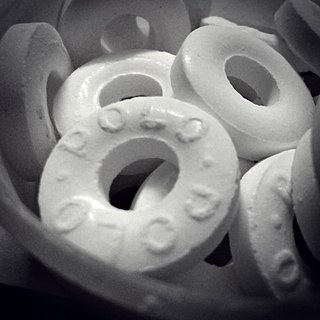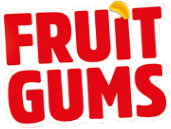
Altoids are a brand of mints, sold primarily in distinctive metal tins. The brand was created by the London-based Smith & Company in the 1780s, and became part of the Callard & Bowser company in the 19th century. Their advertising slogan is "The Original Celebrated Curiously Strong Mints", referring to the high concentration of peppermint oil used in the original flavour lozenge. The mints were originally conceived as a lozenge intended to relieve intestinal discomfort.

Fisherman's Friend is a brand of strong menthol lozenges manufactured by the Lofthouse company in Fleetwood, Lancashire, England.

Polo is a brand of breath mint whose defining feature is the hole in the middle. The peppermint flavoured Polo was first manufactured in the United Kingdom in 1948, by employee John Bargewell at the Rowntree's Factory, York, and a range of flavours followed. The name may derive from "polar", referencing the cool, fresh taste of the mint. Polo mints are also sold in other countries such as India and Sri Lanka by Nestlé. Polo mints are usually sold in a 34g pack containing 23 individual mints.

Starburst is the brand name of a box-shaped, fruit-flavoured soft taffy candy manufactured by The Wrigley Company, which is a subsidiary of Mars, Incorporated. Starburst has many different varieties, such as Tropical, Sour, FaveREDs, Watermelon, Very Berry, Superfruit, Summer Blast and Original.

Pacers is a discontinued British brand of mint flavoured confection, manufactured by Mars.

Angel Delight is a powdered dessert mix produced in the United Kingdom. It is designed to be whisked with milk to create a sweet mousse-like dessert.

Liquorice or licorice is a confection usually flavoured and coloured black with the extract of the roots of the liquorice plant Glycyrrhiza glabra.
Tanqueray is a brand of gin produced by Diageo plc. It originated in London. While it does not command a sizable market share in its native market, its largest market is the US.

Quality Street is a line of tinned and boxed toffees, chocolates and sweets, first manufactured in 1936 by Mackintosh's in Halifax, West Yorkshire, England. It was named after J. M. Barrie's play Quality Street. Since 1988, the confectionery has been produced by Nestlé. Quality Street has long been a competitor to Cadbury Roses, which were launched by Cadbury in 1938.

Rowntree's Fruit Pastilles are small round sweets measuring about 1.5 cm (0.6 in) in diameter; they have a jelly-like consistency, and are covered with sugar. They contain fruit juice, have no artificial colours or flavours, and come in five flavours: lemon (yellow), lime (green), strawberry (red), blackcurrant (purple) and orange (orange).
Tunes are a brand of lozenge, manufactured by Mars Wrigley Confectionery in the United Kingdom. It is marketed as a cough sweet, or anti-congestant lozenge, containing eucalyptus oil and menthol. It is a relative of the now discontinued brand of Spangles, and shares the same packaging and dimensions of that brand.

Yorkie is a chocolate bar made by Nestlé. It was originally made by York-based company Rowntree's, hence the name.
Fruit-tella are chewy sweets similar to Sugus, Starburst and Chewits. They are made using real fruit juice, natural colours and natural flavours, sugar and gelatine. They are made by Perfetti Van Melle, the company that also manufactures Mentos and Chupa Chups.

George Bassett & Co., known simply as Bassett's, was an English confectionery company and brand. The company was founded in Sheffield by George Bassett in 1842. The company became a brand of Cadbury Schweppes in 1989. The brand's final owner was Mondelēz International, which merged the brand with Maynards to create Maynards Bassetts in 2016.

Rowntree's Fruit Gums are circular sweets formerly made by Rowntree's, who were later acquired by Nestlé. There are five flavours, each of a different colour: strawberry, orange, lemon, blackcurrant, and lime.

Midget Gems are chewy, firm sweets similar to wine gums but much harder. They are manufactured from sugar and glucose syrup, corn starch and/or various other starches, animal gelatin, and various colourings and flavouring.
The Wham Bar is a confectionery bar produced by Tangerine Confectionery and sold in the United Kingdom and the Republic of Ireland.

Sherbet is a fizzy, sweet powder, usually eaten by dipping a lollipop or liquorice, using a small spoon, or licking it from a finger.

Rowntree's Randoms are a jelly sweet produced by Nestlé under its Rowntree's brand. The sweet was launched in the United Kingdom on 18 May 2009.

Club is a range of chocolate covered biscuits, sold in the Republic of Ireland under the Jacob's brand name and in the United Kingdom under McVitie's.
















